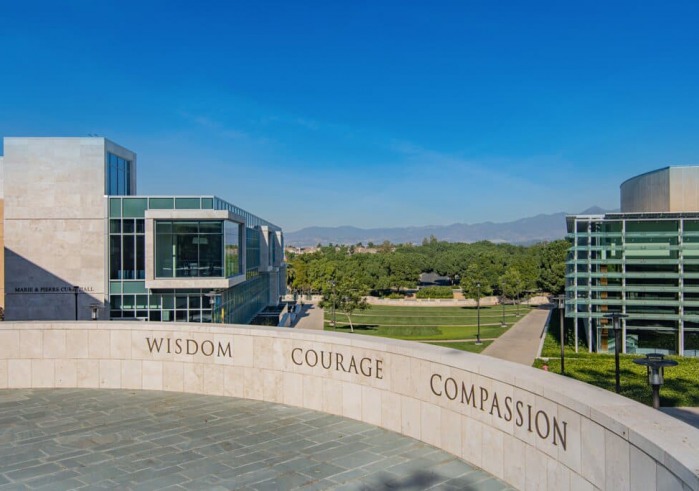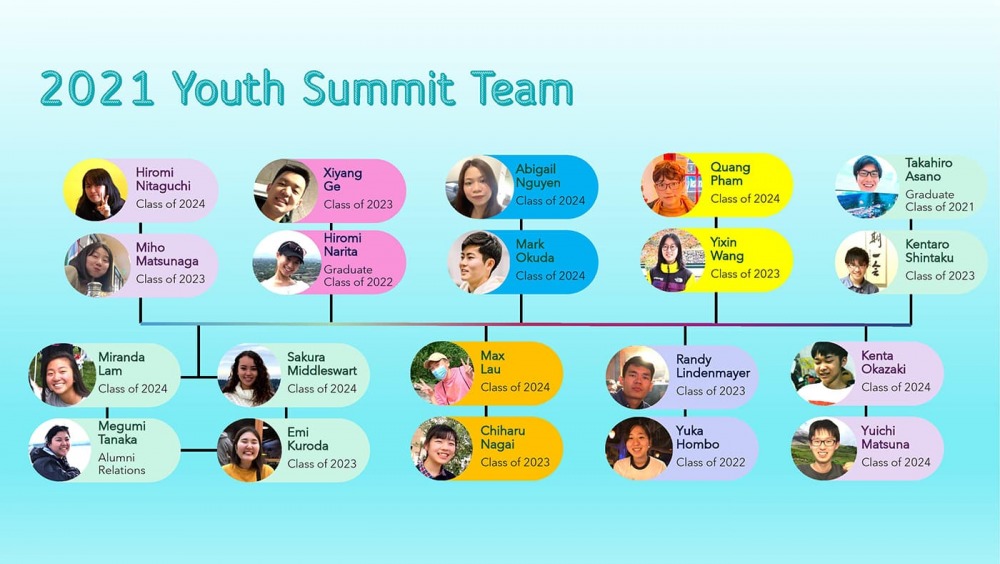At Youth Summit in June, Global Citizens Will Rise in a Time of Crisis

Five years ago, Soka University of America students held the first World Summit of Educators. That involvement will expand exponentially this June. Hundreds of students will gather a week before the World Summit of Educators to bring their voices to bear on the issues shaping the future of education at the first Youth Summit June 5-6.
The theme of the student-organized summit is “Global Citizens: We Arise in a Time of Crisis.” It will be held on a virtual platform that can accommodate up to 1,000 participants under age 30, most of whom are in high school or college. SUA students are expected to make up about a quarter of the Youth Summit participants from all over the world. With a focus on the four intertwined actions of global citizenship—learn, respect, empower, and lead—the Youth Summit is expected to produce a report outlining future goals that will be presented at the World Summit of Educators June 13-14.
The event began in the minds of student organizers Takahiro “Taka” Asano GS ’21, a master’s student in educational leadership and societal change, and Kentaro “Ken” Shintaku ’23, who is passionate about education. They brainstormed while serving on the planning committee for the upcoming World Summit of Educators.
“Ken and I really wanted to maximize the SUA participation in 2021, so we proposed the Youth Summit,” Taka said.
Ken said a major inspiration came from the 2021 Peace Proposal issued Jan. 26 by SUA founder Daisaku Ikeda. “Value Creation in a Time of Crisis” included a beyond COVID-19 youth summit, “a convening of young people to discuss the kind of world they would like to see in the aftermath of this crisis.”
“The Youth Summit testifies to the voices of the students,” Ken said. “So many young people are severely affected by pandemic and feel powerless, and we wanted to find a way to listen to their underheard voices. We inspire and encourage each other, and with empowerment and solidarity, we can step forward together as one.”
The peace proposal educated the student organizers on “the importance of listening to young people in difficult situations, of focusing on people in need who are suffering,” Taka said. “That was eye-opening for me and Ken.”
Using an online platform enables the participation of many more young people from diverse backgrounds. At first, the goal seemed enormous to the 20 student organizers. They designed monthly online dialogues that began in January as a way to gain confidence and experience in event planning, as well as encourage education among their peers.
Each dialogue’s theme was one of the four pillars of education for global citizenship: developmental education, human rights education, environmental education, and peace education. In addition to these theme-based dialogue events, there will be a dialogue event for SUA and other Soka schools around the world. This event is scheduled for May 1 and will be part of the celebration of the 20th anniversary of SUA’s dedication in Aliso Viejo.
Living the University’s Mission
The vision and hard work of these student organizers is a continuation of the enthusiastic initiative of SUA’s first cohort of graduate students in the MA in Educational Leadership and Societal Change program, said SUA Vice President for Institutional Research and Assessment Tomoko Takahashi. The graduate students conceived and formed the first World Summit of Educators in 2016. “We didn’t tell them that we are doing a world summit, they came to us with that idea,” she recalled.
Pride rises in her voice when she talks about the current student creators of the Youth Summit. “These students drove this new youth summit and came up with the ideas for it,” said Takahashi, a co-chair of the World Summit of Educators. “They are so professional. They really are future leaders. We don’t have to tell them what to do because they are self-initiating and self-motivating. They are very active, forward looking and they always want to do more.
“Our students are living our university mission, to lead contributive lives for society, the university, and other students. That’s their motivation.”
Envisioning and planning a major event has sparked personal growth for the organizers.
For Taka, the summit confirms his choice to earn his master’s degree at SUA. Undergraduate studies at Soka University, Japan, fostered his immense curiosity to see how Soka education “was implemented in other societies,” he said. “That is my biggest motivation to pursue my master’s degree here. Secondly, I want to connect with people who share the same passion for making changes in society through the field of education.”
The Youth Summit student committee’s 20 members each have their own responsibilities and leadership roles. Although busy with classes, assignments, and extracurricular activities, they are dedicating their time and energy to meet weekly, making progress toward their vision of creating a space where young people can gather, listen to the voices of others, and empower each other.
For Ken, who came to SUA from Japan after a “life-changing” education at an English language school operated by SUA alumnus Nitesh Sil ’11, organizing the summit has affirmed his choice of college.
“I’m feeling so much appreciation for the World Summit of Educators committee,” Ken said. “I’m really grateful for this opportunity to connect with people in different backgrounds.”
Ken said committee members especially look forward to presenting their report to the World Summit of Educators. “That’s the place where we can convey the voices of young people and demonstrate our determination to make changes,” he said.
Registration for the Youth Summit is open now.
—Michelle Hiskey

